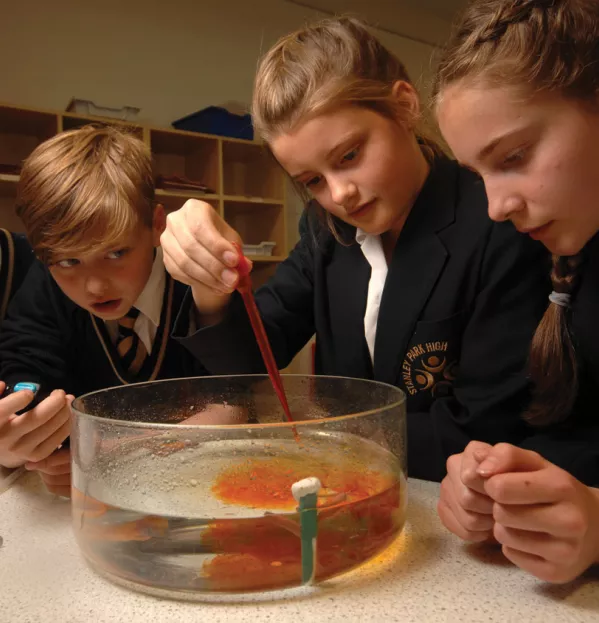Project-based learning holds back poor pupils

Schools have been warned against using project-based learning, because major new research has found that the approach could leave disadvantaged pupils behind.
A government-funded study has found that project-based learning has “a significant negative impact” on the literacy of secondary pupils entitled to free school meals. The 20-month trial found that FSM pupils in project-based classes made three months’ less progress in literacy than peers in traditional subject-based lessons.
In addition, the method has no clear positive impact on the literacy levels or general engagement of the rest of the pupils, according to the research.
Louise Thomas, head of education at the Innovation Unit, carried out the study on behalf of the Education Endowment Foundation (EEF). “We certainly wouldn’t recommend that a school that needs to improve reading scores quickly should implement project-based learning,” she said.
“It’s not a way for schools facing challenging circumstances to improve their reading scores.”
The government-funded EEF, which commissioned the research, also said that schools should seriously question whether it was worth adopting this style of teaching.
But it also warned that some schools had dropped out from the trial, which made the findings of the research less conclusive.
“Project-based learning has implications on timetabling and staffing,” said James Richardson, deputy chief executive of the EEF.
“It’s very expensive, and it involves whole-school change. Teachers should really think very carefully about committing to this.”
‘No positive impact on learning’
Project-based learning requires pupils to work for an extended period of time on a single project, across a range of subjects, rather than in discrete subject lessons. Even advocates of the method accept that it does not offer a quick fix for schools looking to improve their results. Instead, they argue, it offers pupils a broader education than the traditional curriculum.
Around 4,000 Year 7 pupils from 24 secondary schools were involved in the EEF study between September 2014 and April 2016. Half of the pupils were given conventional subject-specific lessons, while half were given a timetable made up of between 20 per cent and 50 per cent project-based learning.
The research shows that, while teachers believed that project-based learning enhanced pupils’ skills, there was no evidence to suggest that it had any impact on learning.
Rachel Wolf, of Parents and Teachers for Excellence, a group campaigning for a return to traditional education, said that the findings were unsurprising.
“In project-based learning, often students are spending a lot of their time focusing on - and thinking about - things that are incidental to the subject that they’re learning about,” she said.
She cited the example of a project in which pupils learned about slavery across a range of different academic subjects. Pupils baking the biscuits that slaves ate would learn more about weighing flour than about slavery, she said.
“There’s often a mistaken assumption that the only way we can engage pupils is by wrapping subjects in other things,” she said. “That’s just not true. Children like facts. They find learning motivating and interesting. We don’t need to come up with sideways angles to teach a subject.”
‘Exciting for the pupils’
But advocates of project-based learning argue that it is not simply about teaching facts or producing academic results. At Stanley Park High, in Carshalton, Surrey, pupils have been taught a 50 per cent project-based curriculum since 2008.
“We fundamentally believe it’s the right thing to do, whether you’re a lower-attaining or a higher-attaining school,” said its executive headteacher, David Taylor.
And Georgina Chatfield, the programme manager for RSA Academies, an academy chain made up of seven schools in the Midlands, said that project-based learning was an effective method of making learning relevant for pupils.
“One school uses it as a practical, creative way that they can say, ‘Hey, parents. This is a way to get involved with our school’,” she said.
“Students are learning about something very real to them - something they can relate to and get very excited by. It involves critical thinking and innovation, from a starting place they can relate to.”
But she agreed with Ms Thomas that the method didn’t offer a quick fix for schools in challenging circumstances.
“If you’re a school that’s successful, you can probably take more risks,” she said. “If you’re a school that’s not so successful, it might mean you’re limited in what you can do.”
Mr Taylor made the same point. “You’re looking at four, five years to make a reasonable job of it,” he said. “And a lot of these schools aren’t giving it that amount of time, unfortunately.”
You need a Tes subscription to read this article
Subscribe now to read this article and get other subscriber-only content:
- Unlimited access to all Tes magazine content
- Exclusive subscriber-only stories
- Award-winning email newsletters
Already a subscriber? Log in
You need a subscription to read this article
Subscribe now to read this article and get other subscriber-only content, including:
- Unlimited access to all Tes magazine content
- Exclusive subscriber-only stories
- Award-winning email newsletters